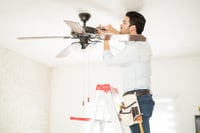While the situation with COVID-19 continues to remain uncertain, in some areas, local governments are lifting or easing the various COVID restrictions enforced since the pandemic’s beginning. While this great news offers cautious optimism for small businesses throughout the country’s neighborhoods, not everything will reset to 2019’s normal.
How can your small business adapt—and thrive—while navigating the blend of new and old normals? What health safety practices should you maintain despite the changes?
COVID regulations by State
While the new regulations for COVID consist of a general rollback, be sure to double-check your state and local restrictions in addition to federal requirements. Check the exact changes and timelines on your state and local government websites to ensure you avoid any violations that might threaten your grand reopening.
Your local Chamber of Commerce should help explain the new regulations for COVID as well and likely offers additional resources and guidance pertaining to your neighborhood.
State-By-State
Looking at COVID regulations by state reveals that most areas around the country have lifted their restrictions as of July 6, 2021. A few states and territories remain in the process of easing their regulations:
- Hawaii
- Idaho
- Indiana
- Maryland
- Puerto Rico
Varying Mask Policies and Vaccinated vs. Unvaccinated
Though many places continue lifting COVID regulations, mask-wearing may stay necessary for workers in certain industries or for certain individuals. For example, when it comes to hospitality and restaurant food safety protocols, these types of businesses may need to continue wearing masks while serving customers in some locations.
Many states still request that unvaccinated individuals continue to mask up, though asking your customers to verify their COVID-19 vaccine status may be taken as an intrusion of privacy.
For example, in Seattle, partially vaccinated or unvaccinated individuals must continue wearing masks. Fully vaccinated Emerald City denizens may ditch their masks indoors (generally) or in crowded outdoor areas after the two-week wait period that follows the completion of the shot series. However, everyone must continue wearing a mask indoors if business owners require it of everyone or in the following places:
- Hospitals, doctors’ offices, long-term care facilities
- Correctional facilities
- Homeless service sites
- Schools and childcare
- While on public transportation
6 Steps for Adapting Your Business Once COVID Regulations are Lifted
Here are a few ideas to consider before you fully reopen your business to your neighbors.
#1 Put the Word Out Around the Neighborhood
When it comes to creating new guidelines for your business, you can’t start putting the word out to neighbors soon enough. Throughout your preparations, let them know:
- When your grand reopening date is
- The steps you’re taking to continue ensuring their safety
- Any self-chosen restrictions your business may keep in place
This should be done through in-person means (if you have a physical storefront) and through all online channels. For example, don’t forget to let local customers know by posting it on Nextdoor. Setting up a Nextdoor Business Page allows you to connect with nearby customers directly and spark conversations with those who matter most—your neighbors.
#2 Create Clear Messaging
Dr. Jason Brinton, the owner of the recently reopened Brinton Vision in St. Louis, MO, summed up the primary consideration small business owners need to keep in mind when communicating with their neighbors about post-pandemic operations: "Customers need to be confident that the businesses they patronize have created a protected environment to which they can safely return."
Be sure to cater your message to your audience. Then, craft a consistent message across the various marketing channels your small business uses (e.g., Nextdoor Business Page, website, email, social media, physical mailers).
By ensuring your message is clear and concise, you set the expectations your customers have when visiting your business.
#3 Take Stock of Your COVID Pivots
Many small businesses that suffered from COVID restrictions or those applicable to their business partners sought opportunities to pivot. Some businesses offered more virtual services while others created delivery systems to meet customers where they were for the pandemic—at home. In a post-pandemic world, customers may have found the advantages of these new services and may come to expect them from their favorite businesses.
As you’re transitioning your business into a new era of regulations, take a moment to review your pivots: what worked and what will keep working?
For example, if you’re a real estate agent who saw a boom in virtual home tour attendance during the pandemic, consider continuing to offer this service so more individuals can check out your listings. Or, if you’ve begun offering outdoor offerings like table massages or workout classes, it might be worth it to continue offering those services.
If you intend to continue some of the new efforts, let former regulars and potential customers know about your expanded offerings.
Plexiglas Pivot in East Williamsburg
In Brooklyn’s East Williamsburg neighborhood, LEERFORM’s exhibition component business experienced a major hurdle as New York’s museum industry temporarily closed down. Leveraging out-of-the-box thinking and their wood and metal shops' fabrication and assembly experience, LEERFORM pivoted to creating personal protective equipment (PPE) from Plexiglas along with their own assembly hardware.
The market for Plexiglas enclosures won’t completely disappear after COVID. Now, LEERFORM can continue capitalizing on this market segment—and potentially expand to customers outside the museum industry further—while normal operations resume.
#4 Start Brainstorming Reopening Promotion Ideas
As you continue shouting from your (online) rooftops about your reopening, consider possible promotional ideas to encourage customers to return in person.
- Sweetening sales – If you intend to announce your reopening with a sale, consider offering an extra promotional item or additional discount to incentivize in-store purchases.
- Celebrate with an arts event – Your customers (and the rest of your community) missed visiting your establishment during the pandemic and so much more, like live performances. To celebrate the return of your customers, reach out to local performers such as musicians, character actors, dance teams, or even local team mascots. Have them perform at your establishment on your opening day so your customers can enjoy an extra post-COVID treat.
- Contests – Create buzz around your reopening with a contest or competition, offering your wares or services as the prize! These contests can be everything from social media follow/comment/like contests to good old fashioned raffles. You can even create a photo contest, asking folks to send pictures of pets, your products in use, or even just their favorite go-to masks. The more creative you can be, the more excitement you’ll cultivate in your community.
#5 Call Out and Reward Loyal Locals
Remember to thank your loyal neighbors who came together to patronize your and other local businesses. Through a Nextdoor Business Page, you can directly offer thanks (and some promotion or discount) to each neighbor who continues to support your business or community efforts throughout these trying times. Extending the promotion to healthcare professionals, food service, and other frontline or essential workers in your community can also expand your customer base.
If you can’t accommodate a full reopening yet and have to continue with capacity restrictions, offering first access to your loyal regulars can help kick start business while letting them know how much you value their support.
#6 Continue Pandemic Practices to Keep Employees and Customers Safe
As you undertake reopening efforts, remember to keep in mind the health of your employees and customers. Some businesses may choose to continue enforcing a mask requirement, social distancing, and heightened cleaning efforts in their locations.
One of the expected consumer trends to continue after COVID’s conclusion is health safety consciousness. Exhibiting to your neighbors that you respect and value their concerns will engender more loyalty.
Some practices to consider continuing include:
- Heightened cleaning of frequented areas – Continuing your dedicated cleaning efforts provides a visible way for customers to see your commitment to their health and safety.
- More in-store signage – Let customers know product locations around your storefront so that those who wish to minimize contact can quickly find the items they’re seeking.
- Embrace contactless payment – Encouraging patrons to take advantage of “tap-and-pay” credit cards and virtual wallets will decrease the number of physical touchpoints on your premises.
- Online ordering with in-store pickup – Continuing to support online ordering with in-store pickup will let you market the service to your health-conscious and on-the-go neighbors.
- Encourage employee rideshares – To decrease their employees' risks while using public transportation, Los Angeles' HomeState taco restaurant encouraged ridesharing by compensating those with cars for picking up their teammates while doubling as a cost-saving idea.
Industry-Specific Adaptation Ideas
Specific industries should take advantage of lifting and new COVID regulations by promoting new or favorite goods and services to attract regulars and potential customers. Some ideas to adapt to the new “post-COVID normal” include:
- Restaurants – If your restaurant features an outdoor dining area, encourage patrons to enjoy the summer weather and their first chances to eat outside in groups. In addition to providing a missed experience guests have longed for, Chris Elford, co-owner of four Seattle food outfits, has found that outdoor dining acts as a living advertisement that they’ve reopened.
- Real Estate – Real estate businesses can begin promoting the return of in-person walkthroughs. Nothing beats seeing a property with your own eyes, but the efforts made to offer virtual tours shouldn’t be discarded post-pandemic. With marketing avenues such as on your Business Page, website, or targeted internet ads, let prospective homebuyers considering a long-distance move know they can still tour virtually. Don’t forget to record and archive your tours—this will allow potential buyers who couldn’t attend the tour (virtually or otherwise) to check things out and decide if they want to put in an offer.
- Gyms and physical fitness businesses – Some gyms began offering online classes to members stuck under stay-at-home orders. Consider continuing some virtual training sessions for busy members, those with unpredictable schedules, and those who still hold concerns over COVID or other illness transmissions in sweaty self-improvement spots. Some sessions can be reused once recorded to minimize effort.
Let Neighbors Know on Nextdoor
In order to interact with your neighbors and inform them of your reopening, associated promotions, and continued cleanliness, look no further than where neighborhoods happen: Nextdoor.
From your Business Page, you can directly connect with your customers, broadcast updated business practices, and answer any questions or concerns they might still have. Happy customers can also recommend your business to friends, family, and other neighbors right on Nextdoor.
Nextdoor allows you to plug into your neighborhood immediately and communicate with neighbors from a place of trust. Your Business Page serves as a hub for reaching your customers who matter most—your local neighbors.
Sources:
CNBC. Four ways consumer spending will change once more people are vaccinated. https://www.cnbc.com/2021/04/11/four-ways-consumer-spending-will-change-once-people-are-vaccinated.html
CO—. 5 Small Business Owners on How They’ve Adapted to COVID-19. https://www.uschamber.com/co/good-company/growth-studio/impact-of-coronavirus-small-business-owner-interview
CO—. How to Effectively Communicate Your Reopening Plans to Customers. https://www.uschamber.com/co/start/strategy/how-to-communicate-business-reopening
King County Health Department. Safe Reopening. https://kingcounty.gov/depts/health/covid-19/safereopen.aspx
Restaurant Hospitality. A Los Angeles taco concept that puts people first. https://www.restaurant-hospitality.com/owners/los-angeles-taco-concept-puts-people-first
Restaurant Hospitality. Restaurant and bar operators share the dos and don’ts of outdoor service. https://www.restaurant-hospitality.com/restaurants-ready/restaurant-and-bar-operators-share-dos-and-don-ts-outdoor-service
USA Today. COVID-19 Restrictions. https://www.usatoday.com/storytelling/coronavirus-reopening-america-map/#restrictions
Claim your free Business Page to get started on Nextdoor. For resources on how to use Nextdoor to stay connected with your local customers, pertinent news affecting businesses, and more, follow us at @nextdoorbusiness on Facebook.








